

SUBSCRIBE TO OUR FREE NEWSLETTER
Daily news & progressive opinion—funded by the people, not the corporations—delivered straight to your inbox.
5
#000000
#FFFFFF
To donate by check, phone, or other method, see our More Ways to Give page.


Daily news & progressive opinion—funded by the people, not the corporations—delivered straight to your inbox.
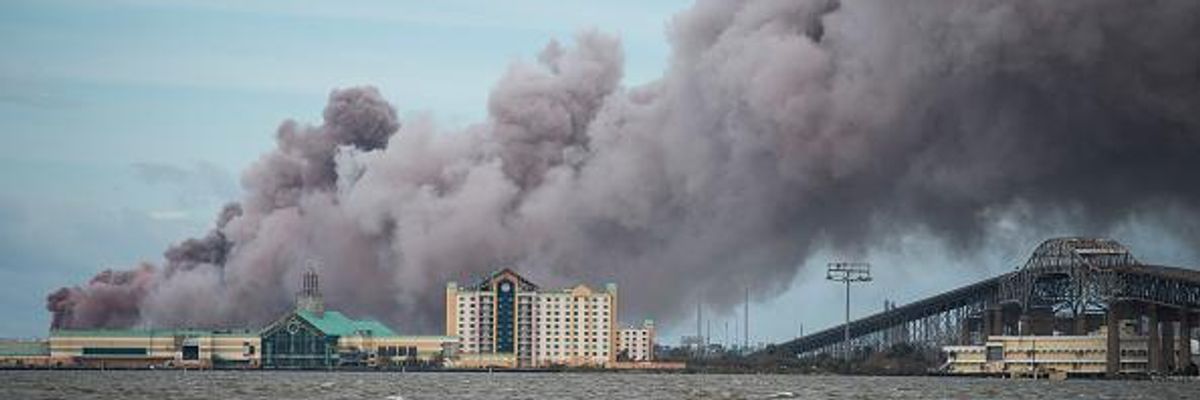
Smoke rises from a burning chemical plant after the passing of Hurricane Laura in Lake Charles, Louisiana on August 27, 2020. Hurricane Laura slammed into the southern US state of Louisiana Thursday and the monster category 4 storm prompted warnings of "unsurvivable" ocean surges and evacuation orders for hundreds of thousands of Gulf Coast residents. The National Hurricane Center (NHC) said "extremely dangerous" Laura would bring winds of 150 miles per hour and "destructive waves will cause catastrophic damage" to Louisiana and Texas. (Photo: Andrew Caballero-Reynolds/AFP via Getty Images)
With the full devastation caused by Hurricane Laura along the Gulf Coast in Texas and Louisiana still coming into view Friday, climate justice activists and other progressives are calling the destruction--credited with claiming at least 6 lives and potentially billions of dollars in damages--just the latest painful example of willful neglect by political leaders and policymakers who continue to treat entire communities and ecological regions as sacrifice zones amid the planetary crisis.
As Common Dreams reported on Thursday, the epicenter of Hurricane Laura was a "region with a high concentration of chemical and fossil fuel plants and infrastructure," generating a dangerous collision of social and environmental factors along the Texas-Louisiana border.
"When people say we can't afford a Green New Deal, what they mean is that the entire Gulf Coast is a sacrificial zone. The death and devastation that Laura and countless other storms have and will bring to the region is worth it, in their estimation."
--Billy Fleming, urban designerDue to a fire that broke out Thursday morning at a chemical factory near Interstate 10 in Lake Charles, Louisiana, Gov. John Bel Edwards urged area residents to turn off their air conditioning units and stay inside.
"Folks who just lost everything in the most rapidly intensifying hurricane in the recorded history of the Gulf of Mexico are now being asked to shelter in place because of a massive chlorine fire," said meteorologist Eric Holthaus on Thursday afternoon.
The city of Lake Charles is predominantly black and has a per capita income of $27,137, reflecting the region's longer and interconnected histories of underdevelopment, anti-unionism, racial segregation, and environmental injustice. Now, residents are dealing with the aftermath of a fresh catastrophe that negatively affects public health--all against the backdrop of Covid-19.
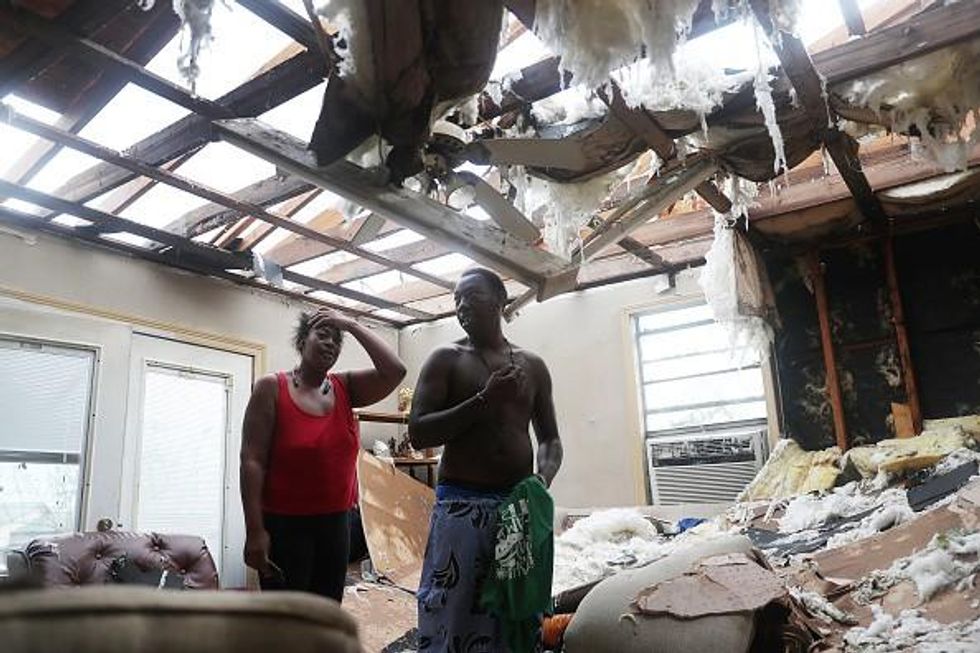
Combining demographic and geographic data from the Census and NOAA's storm surge forecast, social scientist Amine Ouazad had estimated late Wednesday night that approximately 1.2 million people (almost 300,000 households) were at risk to the damage from Laura's surge risk.
Of those 1.2 million people, the more than 250,000 residents without health insurance, 45,000 households residing in mobile homes, over 55,000 households living below the poverty line, and nearly 55,000 non-U.S. citizens for whom English is likely to not be their first language were considered to be among the most vulnerable populations.
Ouazad's research indicated that areas at risk of storm surge tended to have higher rates of poverty than surrounding areas, suggesting that the storm would hit low-income and marginalized populations especially hard.
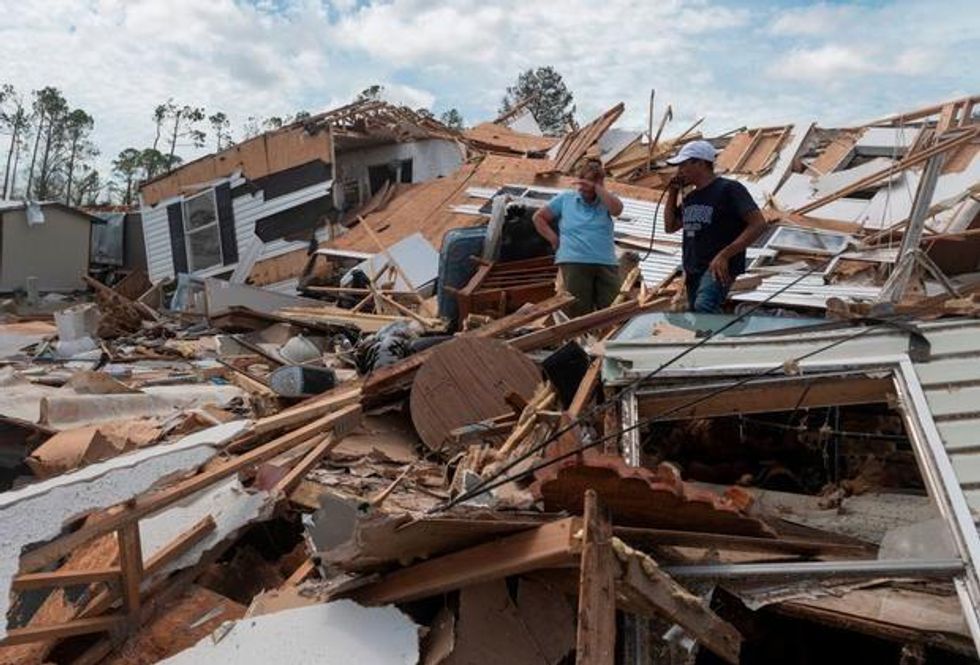
Though the surge of about 9 feet ended up being less than the worst forecast of 15-20 feet, Hurricane Laura's 150 m.p.h. winds ensured that the storm was powerful and destructive.
"The devastation wrought by Hurricane Laura is staggering," said Janet Redmen, Climate Campaign director for Greenpeace USA, on Thursday. "Our greatest concern is for the people across the Gulf Coast whose homes, families, and livelihoods will be forever changed by this storm."
The interaction of the storm with the extant hazards of petrochemical facilities is exacerbating the problem of air pollution, and toxic contaminants from superfund sites could leach into flooded areas and water supplies.
"It feels like we're living Hurricane Harvey all over again," said Juan Parras, founder and co-executive director of Texas Environmental Justice Advocacy Services.
Climate journalist Emily Atkin referred to Hurricane Laura as "Katrina on fossil fuel steroids," alluding to the combination of preexisting inequalities, the storm's intensity, and its path, which included more than 60 petrochemical plants and oil refineries as well as 49 hazardous waste facilities.
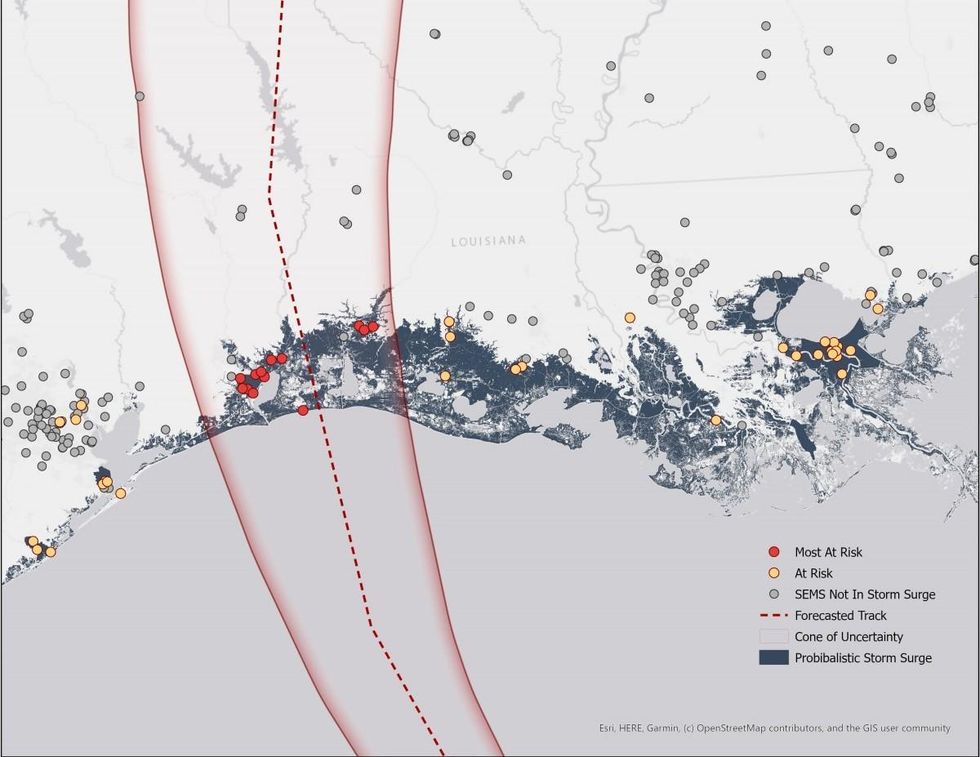
Moreover, this disaster is occurring in the midst of the coronavirus pandemic and economic recession, so the residential dislocations, closures of grocers, pharmacies, and other key sites of work and consumption plus widespread infrastructural damage wrought by Hurricane Laura will make daily life even more precarious, Cedric Johnson, editor of The Neoliberal Deluge: Hurricane Katrina, Late Capitalism, and the Remaking of New Orleans, told Common Dreams.
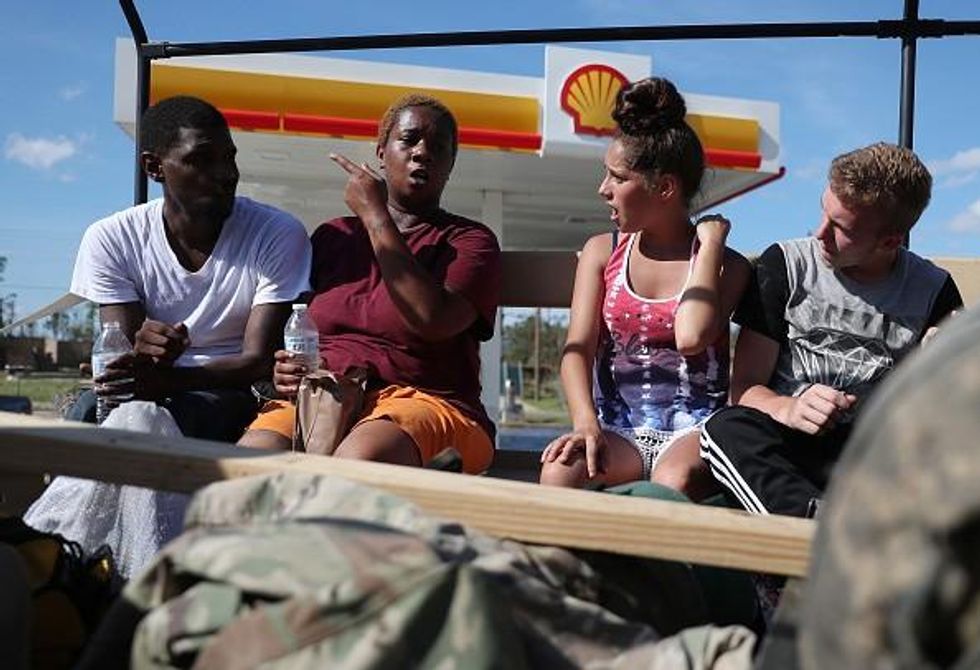
Atkin added that recent events are unfolding as President Donald Trump "vies for re-election, under a Republican-led vision for the future that does not include a single word about addressing the crisis at hand."
In response to Trump's speech Thursday on the final night of this week's Republican National Convention, Natalie Mebane, associate policy director for 350 Action, put the storm's devastation in the context of the GOP's ongoing hostility towards the broader crises of inequality and climate change.
"Trump and the RNC are negligent, period," Mebane said. "The sharp juxtaposition between what came out of RNC speakers' mouths this week and the compounding crises of health, racial injustice, and climate disaster that Americans are facing is further evidence of how preposterously out of touch the party is."
Greenpeace's Redman said that the president's climate failures, combined with his woeful mismanagemnet of the pandemic, are wreaking havoc for the nation's most vulnerable communities.
"Hurricane Laura--as well as the climate-intensified wildfires raging in California--is undeniable proof that the climate crisis is here," she said. "Trump's utter failure to contain COVID-19 has combined with his administration's dangerous climate denial to create an unprecedented emergency. People across the country are reeling from the health and economic fallout from the COVID-19 pandemic, but Trump is rolling back climate protections, defunding FEMA, and bailing out fossil fuel corporations."
"As is so often the case, Black, Brown, Indigenous, and working-class communities will feel the impacts of Trump's failures the hardest," Redman added. "These communities are most likely to live near toxic facilities vulnerable to flooding--like the hundreds of oil refineries and petrochemical plants in the Gulf South that evacuated ahead of Hurricane Laura--and often have the fewest means to rebuild when disasters strike."
In May, a study published in Nature Climate Change argued that "the Covid-19 pandemic will be an unprecedented test of government's ability to manage compound risks, as climate hazards disrupt outbreak response around the world."
An accompanying map predicting how "climate-attributable risks are likely to intersect with the Covid-19 crisis all around the world" now appears eerily prescient.
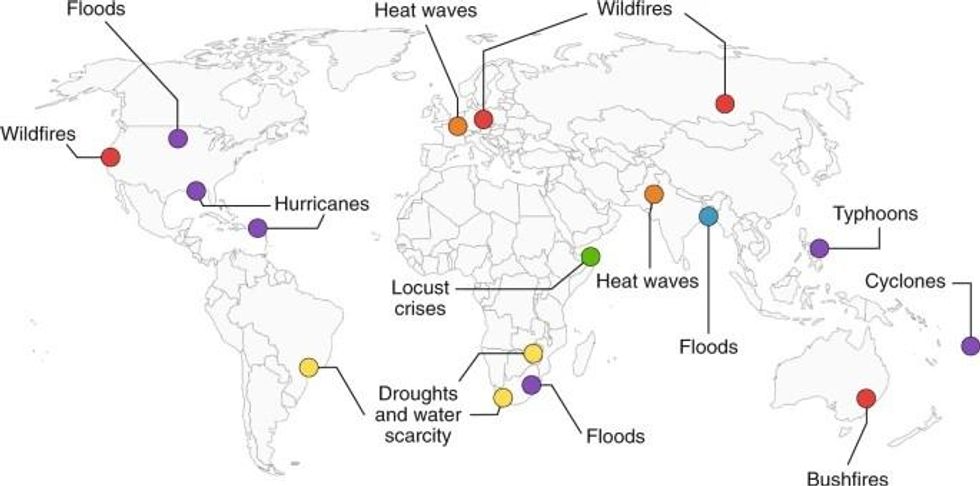
While Trump and the Republican Party's climate denialism is unmatched, it has been acknowledged for years without a commensurate policy response that Gulf Coast cities adjacent to the region's major petrochemical hub are "unprepared for the hurricane that could bring ecological and economic disaster," as documented in a 2016 photo essay by ProPublica and the Texas Tribune.
Alicia Cooke of 350 New Orleans said, "When we rely on a fossil fuel economy, we rely on the integrity of oil and gas infrastructure, which has become increasingly vulnerable as storms continue to strengthen year after year."
Phil Bedient, an engineering professor at Rice University and co-director of the Storm Surge Prediction, Education, and Evacuation from Disasters (SSPEED) Center remarked in 2016, "We're sitting ducks. We've done nothing."
"Long before Trump entered office, oil and gas CEOs predicted this would be the result of their unfettered industry," said Redmen. "Climate denial is not a victimless crime, and it's time for the fossil fuel industry to be held accountable. We demand that the oil and gas companies responsible for fueling the climate crisis pay for community recovery from this disaster."
Bloomberg estimated that flooding, chemical fires, and damage to buildings and infrastructure could amount to more than $15 billion in insured losses.
Billy Fleming, an urbanist who studies the impacts of climate change on the built environment, observed that "When people say we can't afford a Green New Deal, what they mean is that the entire Gulf Coast is a sacrificial zone. The death and devastation that Laura and countless other storms have and will bring to the region is worth it, in their estimation."
Dear Common Dreams reader, The U.S. is on a fast track to authoritarianism like nothing I've ever seen. Meanwhile, corporate news outlets are utterly capitulating to Trump, twisting their coverage to avoid drawing his ire while lining up to stuff cash in his pockets. That's why I believe that Common Dreams is doing the best and most consequential reporting that we've ever done. Our small but mighty team is a progressive reporting powerhouse, covering the news every day that the corporate media never will. Our mission has always been simple: To inform. To inspire. And to ignite change for the common good. Now here's the key piece that I want all our readers to understand: None of this would be possible without your financial support. That's not just some fundraising cliche. It's the absolute and literal truth. We don't accept corporate advertising and never will. We don't have a paywall because we don't think people should be blocked from critical news based on their ability to pay. Everything we do is funded by the donations of readers like you. Will you donate now to help power the nonprofit, independent reporting of Common Dreams? Thank you for being a vital member of our community. Together, we can keep independent journalism alive when it’s needed most. - Craig Brown, Co-founder |
With the full devastation caused by Hurricane Laura along the Gulf Coast in Texas and Louisiana still coming into view Friday, climate justice activists and other progressives are calling the destruction--credited with claiming at least 6 lives and potentially billions of dollars in damages--just the latest painful example of willful neglect by political leaders and policymakers who continue to treat entire communities and ecological regions as sacrifice zones amid the planetary crisis.
As Common Dreams reported on Thursday, the epicenter of Hurricane Laura was a "region with a high concentration of chemical and fossil fuel plants and infrastructure," generating a dangerous collision of social and environmental factors along the Texas-Louisiana border.
"When people say we can't afford a Green New Deal, what they mean is that the entire Gulf Coast is a sacrificial zone. The death and devastation that Laura and countless other storms have and will bring to the region is worth it, in their estimation."
--Billy Fleming, urban designerDue to a fire that broke out Thursday morning at a chemical factory near Interstate 10 in Lake Charles, Louisiana, Gov. John Bel Edwards urged area residents to turn off their air conditioning units and stay inside.
"Folks who just lost everything in the most rapidly intensifying hurricane in the recorded history of the Gulf of Mexico are now being asked to shelter in place because of a massive chlorine fire," said meteorologist Eric Holthaus on Thursday afternoon.
The city of Lake Charles is predominantly black and has a per capita income of $27,137, reflecting the region's longer and interconnected histories of underdevelopment, anti-unionism, racial segregation, and environmental injustice. Now, residents are dealing with the aftermath of a fresh catastrophe that negatively affects public health--all against the backdrop of Covid-19.

Combining demographic and geographic data from the Census and NOAA's storm surge forecast, social scientist Amine Ouazad had estimated late Wednesday night that approximately 1.2 million people (almost 300,000 households) were at risk to the damage from Laura's surge risk.
Of those 1.2 million people, the more than 250,000 residents without health insurance, 45,000 households residing in mobile homes, over 55,000 households living below the poverty line, and nearly 55,000 non-U.S. citizens for whom English is likely to not be their first language were considered to be among the most vulnerable populations.
Ouazad's research indicated that areas at risk of storm surge tended to have higher rates of poverty than surrounding areas, suggesting that the storm would hit low-income and marginalized populations especially hard.

Though the surge of about 9 feet ended up being less than the worst forecast of 15-20 feet, Hurricane Laura's 150 m.p.h. winds ensured that the storm was powerful and destructive.
"The devastation wrought by Hurricane Laura is staggering," said Janet Redmen, Climate Campaign director for Greenpeace USA, on Thursday. "Our greatest concern is for the people across the Gulf Coast whose homes, families, and livelihoods will be forever changed by this storm."
The interaction of the storm with the extant hazards of petrochemical facilities is exacerbating the problem of air pollution, and toxic contaminants from superfund sites could leach into flooded areas and water supplies.
"It feels like we're living Hurricane Harvey all over again," said Juan Parras, founder and co-executive director of Texas Environmental Justice Advocacy Services.
Climate journalist Emily Atkin referred to Hurricane Laura as "Katrina on fossil fuel steroids," alluding to the combination of preexisting inequalities, the storm's intensity, and its path, which included more than 60 petrochemical plants and oil refineries as well as 49 hazardous waste facilities.

Moreover, this disaster is occurring in the midst of the coronavirus pandemic and economic recession, so the residential dislocations, closures of grocers, pharmacies, and other key sites of work and consumption plus widespread infrastructural damage wrought by Hurricane Laura will make daily life even more precarious, Cedric Johnson, editor of The Neoliberal Deluge: Hurricane Katrina, Late Capitalism, and the Remaking of New Orleans, told Common Dreams.

Atkin added that recent events are unfolding as President Donald Trump "vies for re-election, under a Republican-led vision for the future that does not include a single word about addressing the crisis at hand."
In response to Trump's speech Thursday on the final night of this week's Republican National Convention, Natalie Mebane, associate policy director for 350 Action, put the storm's devastation in the context of the GOP's ongoing hostility towards the broader crises of inequality and climate change.
"Trump and the RNC are negligent, period," Mebane said. "The sharp juxtaposition between what came out of RNC speakers' mouths this week and the compounding crises of health, racial injustice, and climate disaster that Americans are facing is further evidence of how preposterously out of touch the party is."
Greenpeace's Redman said that the president's climate failures, combined with his woeful mismanagemnet of the pandemic, are wreaking havoc for the nation's most vulnerable communities.
"Hurricane Laura--as well as the climate-intensified wildfires raging in California--is undeniable proof that the climate crisis is here," she said. "Trump's utter failure to contain COVID-19 has combined with his administration's dangerous climate denial to create an unprecedented emergency. People across the country are reeling from the health and economic fallout from the COVID-19 pandemic, but Trump is rolling back climate protections, defunding FEMA, and bailing out fossil fuel corporations."
"As is so often the case, Black, Brown, Indigenous, and working-class communities will feel the impacts of Trump's failures the hardest," Redman added. "These communities are most likely to live near toxic facilities vulnerable to flooding--like the hundreds of oil refineries and petrochemical plants in the Gulf South that evacuated ahead of Hurricane Laura--and often have the fewest means to rebuild when disasters strike."
In May, a study published in Nature Climate Change argued that "the Covid-19 pandemic will be an unprecedented test of government's ability to manage compound risks, as climate hazards disrupt outbreak response around the world."
An accompanying map predicting how "climate-attributable risks are likely to intersect with the Covid-19 crisis all around the world" now appears eerily prescient.

While Trump and the Republican Party's climate denialism is unmatched, it has been acknowledged for years without a commensurate policy response that Gulf Coast cities adjacent to the region's major petrochemical hub are "unprepared for the hurricane that could bring ecological and economic disaster," as documented in a 2016 photo essay by ProPublica and the Texas Tribune.
Alicia Cooke of 350 New Orleans said, "When we rely on a fossil fuel economy, we rely on the integrity of oil and gas infrastructure, which has become increasingly vulnerable as storms continue to strengthen year after year."
Phil Bedient, an engineering professor at Rice University and co-director of the Storm Surge Prediction, Education, and Evacuation from Disasters (SSPEED) Center remarked in 2016, "We're sitting ducks. We've done nothing."
"Long before Trump entered office, oil and gas CEOs predicted this would be the result of their unfettered industry," said Redmen. "Climate denial is not a victimless crime, and it's time for the fossil fuel industry to be held accountable. We demand that the oil and gas companies responsible for fueling the climate crisis pay for community recovery from this disaster."
Bloomberg estimated that flooding, chemical fires, and damage to buildings and infrastructure could amount to more than $15 billion in insured losses.
Billy Fleming, an urbanist who studies the impacts of climate change on the built environment, observed that "When people say we can't afford a Green New Deal, what they mean is that the entire Gulf Coast is a sacrificial zone. The death and devastation that Laura and countless other storms have and will bring to the region is worth it, in their estimation."
With the full devastation caused by Hurricane Laura along the Gulf Coast in Texas and Louisiana still coming into view Friday, climate justice activists and other progressives are calling the destruction--credited with claiming at least 6 lives and potentially billions of dollars in damages--just the latest painful example of willful neglect by political leaders and policymakers who continue to treat entire communities and ecological regions as sacrifice zones amid the planetary crisis.
As Common Dreams reported on Thursday, the epicenter of Hurricane Laura was a "region with a high concentration of chemical and fossil fuel plants and infrastructure," generating a dangerous collision of social and environmental factors along the Texas-Louisiana border.
"When people say we can't afford a Green New Deal, what they mean is that the entire Gulf Coast is a sacrificial zone. The death and devastation that Laura and countless other storms have and will bring to the region is worth it, in their estimation."
--Billy Fleming, urban designerDue to a fire that broke out Thursday morning at a chemical factory near Interstate 10 in Lake Charles, Louisiana, Gov. John Bel Edwards urged area residents to turn off their air conditioning units and stay inside.
"Folks who just lost everything in the most rapidly intensifying hurricane in the recorded history of the Gulf of Mexico are now being asked to shelter in place because of a massive chlorine fire," said meteorologist Eric Holthaus on Thursday afternoon.
The city of Lake Charles is predominantly black and has a per capita income of $27,137, reflecting the region's longer and interconnected histories of underdevelopment, anti-unionism, racial segregation, and environmental injustice. Now, residents are dealing with the aftermath of a fresh catastrophe that negatively affects public health--all against the backdrop of Covid-19.

Combining demographic and geographic data from the Census and NOAA's storm surge forecast, social scientist Amine Ouazad had estimated late Wednesday night that approximately 1.2 million people (almost 300,000 households) were at risk to the damage from Laura's surge risk.
Of those 1.2 million people, the more than 250,000 residents without health insurance, 45,000 households residing in mobile homes, over 55,000 households living below the poverty line, and nearly 55,000 non-U.S. citizens for whom English is likely to not be their first language were considered to be among the most vulnerable populations.
Ouazad's research indicated that areas at risk of storm surge tended to have higher rates of poverty than surrounding areas, suggesting that the storm would hit low-income and marginalized populations especially hard.

Though the surge of about 9 feet ended up being less than the worst forecast of 15-20 feet, Hurricane Laura's 150 m.p.h. winds ensured that the storm was powerful and destructive.
"The devastation wrought by Hurricane Laura is staggering," said Janet Redmen, Climate Campaign director for Greenpeace USA, on Thursday. "Our greatest concern is for the people across the Gulf Coast whose homes, families, and livelihoods will be forever changed by this storm."
The interaction of the storm with the extant hazards of petrochemical facilities is exacerbating the problem of air pollution, and toxic contaminants from superfund sites could leach into flooded areas and water supplies.
"It feels like we're living Hurricane Harvey all over again," said Juan Parras, founder and co-executive director of Texas Environmental Justice Advocacy Services.
Climate journalist Emily Atkin referred to Hurricane Laura as "Katrina on fossil fuel steroids," alluding to the combination of preexisting inequalities, the storm's intensity, and its path, which included more than 60 petrochemical plants and oil refineries as well as 49 hazardous waste facilities.

Moreover, this disaster is occurring in the midst of the coronavirus pandemic and economic recession, so the residential dislocations, closures of grocers, pharmacies, and other key sites of work and consumption plus widespread infrastructural damage wrought by Hurricane Laura will make daily life even more precarious, Cedric Johnson, editor of The Neoliberal Deluge: Hurricane Katrina, Late Capitalism, and the Remaking of New Orleans, told Common Dreams.

Atkin added that recent events are unfolding as President Donald Trump "vies for re-election, under a Republican-led vision for the future that does not include a single word about addressing the crisis at hand."
In response to Trump's speech Thursday on the final night of this week's Republican National Convention, Natalie Mebane, associate policy director for 350 Action, put the storm's devastation in the context of the GOP's ongoing hostility towards the broader crises of inequality and climate change.
"Trump and the RNC are negligent, period," Mebane said. "The sharp juxtaposition between what came out of RNC speakers' mouths this week and the compounding crises of health, racial injustice, and climate disaster that Americans are facing is further evidence of how preposterously out of touch the party is."
Greenpeace's Redman said that the president's climate failures, combined with his woeful mismanagemnet of the pandemic, are wreaking havoc for the nation's most vulnerable communities.
"Hurricane Laura--as well as the climate-intensified wildfires raging in California--is undeniable proof that the climate crisis is here," she said. "Trump's utter failure to contain COVID-19 has combined with his administration's dangerous climate denial to create an unprecedented emergency. People across the country are reeling from the health and economic fallout from the COVID-19 pandemic, but Trump is rolling back climate protections, defunding FEMA, and bailing out fossil fuel corporations."
"As is so often the case, Black, Brown, Indigenous, and working-class communities will feel the impacts of Trump's failures the hardest," Redman added. "These communities are most likely to live near toxic facilities vulnerable to flooding--like the hundreds of oil refineries and petrochemical plants in the Gulf South that evacuated ahead of Hurricane Laura--and often have the fewest means to rebuild when disasters strike."
In May, a study published in Nature Climate Change argued that "the Covid-19 pandemic will be an unprecedented test of government's ability to manage compound risks, as climate hazards disrupt outbreak response around the world."
An accompanying map predicting how "climate-attributable risks are likely to intersect with the Covid-19 crisis all around the world" now appears eerily prescient.

While Trump and the Republican Party's climate denialism is unmatched, it has been acknowledged for years without a commensurate policy response that Gulf Coast cities adjacent to the region's major petrochemical hub are "unprepared for the hurricane that could bring ecological and economic disaster," as documented in a 2016 photo essay by ProPublica and the Texas Tribune.
Alicia Cooke of 350 New Orleans said, "When we rely on a fossil fuel economy, we rely on the integrity of oil and gas infrastructure, which has become increasingly vulnerable as storms continue to strengthen year after year."
Phil Bedient, an engineering professor at Rice University and co-director of the Storm Surge Prediction, Education, and Evacuation from Disasters (SSPEED) Center remarked in 2016, "We're sitting ducks. We've done nothing."
"Long before Trump entered office, oil and gas CEOs predicted this would be the result of their unfettered industry," said Redmen. "Climate denial is not a victimless crime, and it's time for the fossil fuel industry to be held accountable. We demand that the oil and gas companies responsible for fueling the climate crisis pay for community recovery from this disaster."
Bloomberg estimated that flooding, chemical fires, and damage to buildings and infrastructure could amount to more than $15 billion in insured losses.
Billy Fleming, an urbanist who studies the impacts of climate change on the built environment, observed that "When people say we can't afford a Green New Deal, what they mean is that the entire Gulf Coast is a sacrificial zone. The death and devastation that Laura and countless other storms have and will bring to the region is worth it, in their estimation."